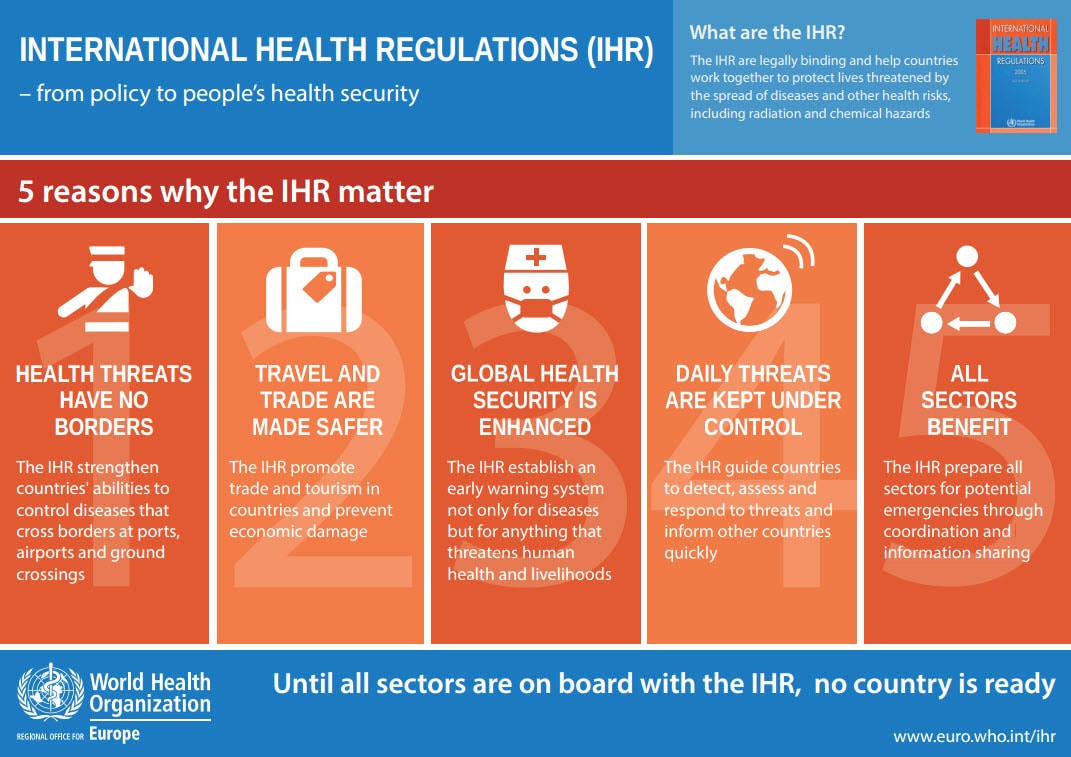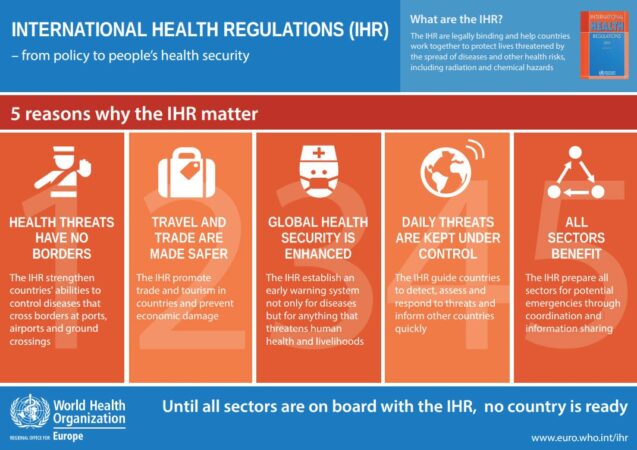
International Health Regulations (IHR) Framework
The International Health Regulations (IHR) is a legally binding agreement between 196 countries to prevent and respond to the international spread of disease. Its primary objectives are to:
– Prevent, protect against, control, and provide a public health response to the international spread of disease.
– Strengthen the capacity of countries to detect, assess, notify, and respond to public health risks and emergencies.
– Promote international cooperation on public health matters.
The IHR’s legal framework is based on the principle of state sovereignty, which means that each country is responsible for its own public health. However, the IHR also recognizes that the international spread of disease can pose a threat to global health security. As such, the IHR requires countries to take certain measures to prevent and respond to the international spread of disease.
The IHR’s core capacities are essential for countries to be able to effectively prevent and respond to the international spread of disease. These capacities include:
– Surveillance: The ability to detect and monitor disease outbreaks.
– Risk assessment: The ability to assess the risk of disease outbreaks and to take appropriate action to prevent or mitigate them.
– Response: The ability to respond to disease outbreaks in a timely and effective manner.
– Communication: The ability to communicate information about disease outbreaks to the public and to other countries.
IHR Monitoring and Reporting
The IHR establishes a global framework for surveillance and reporting of public health events of international concern.
The IHR monitoring and reporting mechanisms are designed to:
- Detect and assess public health risks;
- Provide timely information to decision-makers;
- Facilitate a coordinated international response.
National IHR Focal Points
Each country has a designated National IHR Focal Point (NIFP) responsible for:
- Collecting and analyzing data on public health events;
- Notifying WHO of events that may constitute a public health emergency of international concern (PHEIC);
- Coordinating with other national authorities and international partners.
Notifying and Responding to Public Health Emergencies
When a NIFP identifies an event that may constitute a PHEIC, it must notify WHO within 24 hours. WHO then assesses the event and decides whether to declare a PHEIC.
If a PHEIC is declared, WHO provides technical assistance to the affected country and coordinates a global response.
IHR Risk Assessment and Management
The IHR provides a framework for countries to assess and manage public health risks that may arise from cross-border travel and trade. It establishes a set of core capacities that countries should develop and maintain to prevent, detect, and respond to public health emergencies.
The IHR risk assessment process involves identifying, assessing, and prioritizing public health risks that may arise from cross-border travel and trade. This process helps countries to determine the appropriate measures to take to reduce the risk of these events occurring. The IHR also provides guidance on how to manage public health emergencies, including how to activate and coordinate response mechanisms, communicate with the public, and provide support to affected countries.
Public Health Emergency of International Concern (PHEIC)
A Public Health Emergency of International Concern (PHEIC) is a public health event that constitutes a public health risk to other countries through the international spread of disease. The World Health Organization (WHO) declares a PHEIC when there is a serious, sudden, unusual, or unexpected event that has the potential to spread internationally and pose a public health risk.
The declaration of a PHEIC triggers a number of actions by the WHO and other international organizations. These actions include providing technical assistance to affected countries, coordinating international response efforts, and providing financial support to countries in need.
Risk Management Measures
The IHR provides a number of risk management measures that countries can implement to reduce the risk of public health emergencies. These measures include:
- Strengthening surveillance systems to detect and respond to public health events early.
- Developing and maintaining core capacities for public health emergencies, such as laboratory capacity, emergency response teams, and risk communication systems.
- Implementing measures to reduce the risk of transmission of diseases through international travel and trade, such as screening travelers for symptoms of disease and implementing quarantine measures.
- Collaborating with other countries and international organizations to share information and coordinate response efforts.
The IHR risk assessment and management framework is an essential tool for countries to prevent, detect, and respond to public health emergencies. By implementing the measures Artikeld in the IHR, countries can help to protect their populations from the risks of cross-border travel and trade.
IHR Capacity Building and Technical Cooperation

The International Health Regulations (IHR) recognize the importance of capacity building and technical cooperation to strengthen global health security. The IHR framework provides for countries to develop, strengthen, and maintain their core capacities to prevent, detect, and respond to public health risks.
The World Health Organization (WHO) plays a vital role in supporting countries in implementing the IHR. WHO provides technical assistance, training, and resources to help countries assess their capacities, develop national action plans, and implement IHR measures.
Capacity Building Initiatives
WHO and other partners have undertaken numerous capacity-building initiatives to support IHR implementation. These initiatives include:
– Developing and disseminating training materials and guidance on IHR implementation
– Providing technical assistance to countries in developing national IHR action plans
– Supporting the establishment of national IHR focal points and emergency response teams
– Training health professionals on IHR requirements and best practices
– Strengthening laboratory and surveillance systems for early detection and response to public health risks
IHR Implementation and Challenges
The implementation of the International Health Regulations (IHR) has progressed globally, with varying levels of success. While many countries have made significant strides, challenges and gaps remain.
Current Status of IHR Implementation
As of 2023, 196 countries have signed the IHR, and 194 have enacted it into national law. Most countries have established national IHR focal points and developed national action plans for IHR implementation.
Challenges and Gaps
Despite the progress made, several challenges and gaps hinder effective IHR implementation:
- Insufficient funding: Many countries face financial constraints that limit their ability to invest in IHR-related activities, such as surveillance, laboratory capacity, and emergency preparedness.
- Weak health systems: In some countries, health systems are weak and lack the infrastructure, human resources, and technology needed to implement IHR effectively.
- Lack of political commitment: In some cases, political commitment to IHR implementation is lacking, which can result in inadequate resource allocation and limited support for IHR-related activities.
- Limited coordination: Coordination between different sectors and agencies involved in IHR implementation is often weak, leading to duplication of efforts and gaps in coverage.
Best Practices and Lessons Learned
Countries that have successfully implemented the IHR have adopted several best practices:
- Strong political commitment: Political leaders have demonstrated a clear commitment to IHR implementation and have provided adequate funding and support.
- Effective coordination: National IHR focal points have effectively coordinated efforts between different sectors and agencies, ensuring a comprehensive and integrated approach.
- Capacity building: Countries have invested in training and capacity building for health workers and other stakeholders involved in IHR implementation.
- Regular monitoring and evaluation: Countries have established systems for regular monitoring and evaluation of IHR implementation, allowing for timely adjustments and improvements.
IHR and Global Health Security
The International Health Regulations (IHR) play a pivotal role in promoting global health security by providing a framework for countries to collaborate and respond effectively to public health threats. They establish a set of legally binding requirements for countries to prevent, detect, and respond to health emergencies, including outbreaks of infectious diseases.
The IHR contribute to pandemic preparedness and response by:
- Requiring countries to develop and maintain national surveillance systems to detect and report outbreaks of diseases of international concern.
- Establishing mechanisms for rapid information sharing between countries and the World Health Organization (WHO) to facilitate early detection and response.
- Providing guidance and support to countries in developing and implementing public health measures to prevent and control the spread of infectious diseases.
The IHR have been used to strengthen global health security in numerous ways, including:
- The development of global surveillance networks for monitoring and reporting outbreaks of infectious diseases.
- The establishment of regional emergency response teams to provide rapid assistance to countries facing health emergencies.
- The development of training programs to strengthen the capacity of health workers to respond to public health emergencies.





